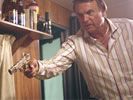Eye For Film >> Movies >> Little Fish (2005) Film Review
In the final scene, some of the characters loll about on the beach, staring perplexedly out to the sea. It's a wildly metaphorical moment, the beach and sea stretching beyond, representing the end of the land and the completion of a journey. Trouble is, the feeling of a journey and sense of progression is the very quality Little Fish crucially lacks. The seascape merely concludes a story that has been treading water, rather than swimming in any noticeable direction.
This flaw is the only real weakness to a gloomy and meditative Australian film, with an exceptional cast and crew. Based on an idea director Rowan Woods had after graduating from film school and set in Sydney's Little Saigon, a poor outer suburb, full of people of Asian descent, Little Fish makes for provocative, cerebral viewing.

The plot, as with the lives of this motley set of characters, revolves around drugs. From local hood Brad "The Jockey" Thompson (Sam Neill), the drug chain runs down through henchmen, ambitious rookies plotting to seize control, dealers and, at the bottom, addicts, such as Lionel (balding, withered Hugo Weaving), a former Australian Rules star.
Plum in the middle of this crowd sits former addict Tracy Heart (Cate Blanchett), who struggles desperately to remain loyal to her friends as they err and continue ignoring the lure of narcotics. She is accompanied in this battle by her angry, righteous and ultimately kind-hearted mother (Noni Hazlehurst), a fraught soul who struggles to let other people's failings pass as easily as her daughter does.
We follow Tracy through a week in this regressive world, as the ramifications of Brad's retirement become profoundly obvious for all to see. As Tracy tries to ignore her lonely temptation for a slimy former lover, to convince the bank to extend her loan and to halt Lionel's inexorable decline, her life becomes a terrifying struggle between humiliation and impending tragedy.
Despite the drug theme, Requiem For A Dream this is not. There are no scenes of drug taking - as Lionel prepares to shoot up, he asks Tracy to leave the room, and the camera goes with her. Thanks to the selection of the "clean" Tracy as protagonist and, indeed, heroine, Little Fish dwells far more on affairs of the heart and the worry of getting old and failing in life, than didactically on the effects of drugs.
No character is detestable; rather they are loveable rogues with forgivable weaknesses. Even the hulking Brad has tender moments and this basic good nature is deeply stressed by Woods. Tracy is a thirtysomething singleton, living with her mother, working in a video shop and going nowhere. She is surrounded by friends and family, ruining their lives, yet her affectionate and compassionate nature is made abundantly clear and, as a non-drug user, seems positively heavenly within the environs of the film.
Despite Blanchett's profound beauty, Tracy is easily related to as a character with identifiable problems. Like her, we all have regrets and a sense that our lives aren't taking the direction they should and can empathise with a lonely, zealous heart. Although Weaving gives a star turn as Lionel, a man with painfully acute self-awareness, Blanchett is better still. Her goodness is impossible to disregard.
Like a previous Australian favourite, Lantana, Little Fish is a sombre, slow burning piece that is classy and well made. Whereas Lantana had one top draw Australian character actor (Geoffrey Rush), this has three. While Lantana was an engrossing thriller, Little Fish, even with more scenes of action and opportunity for adrenalin rushes, is simply a humdrum melodrama that cannot get out of first gear.
Were it not for the absence of thrills, or momentum, this might have been magnificent. As it is, it is merely creditable.
Reviewed on: 21 Jul 2006





















